How to get rid of aphids on roses: effective ways to combat, preparations for treatment
What could be more beautiful than roses on earth? Only roses! Without any exaggeration, we can say that an exquisite flower conquers like a small work of art that you look at for hours. With its presence in the garden, an unimaginably spectacular plant ennobles the territory, fully demonstrating all the beauty inherent in it. However, there are significant reasons to worry about this magnificence, and one of them is the aphid invasion, which is spreading with incredible force. It looks like aphids are a very small and defenseless insect, but it can easily destroy or noticeably spoil all our dreams of a blooming, fragrant rose garden, because it is especially sad to see aphids on wonderful roses. That is why it is necessary to wage an irreconcilable, uncompromising struggle with the parasite.
Our article will tell you about preventive treatments for aphids in the spring, as well as about a variety of ways to combat it in the summer.
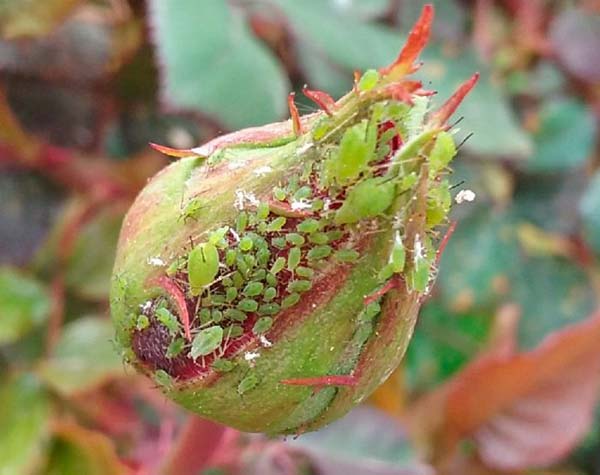
Content
What harmaphidinflicts roses and where it comes from
Why is she so dangerous for the queen of the garden?
Aphids gladly suck out all the juice from young shoots, from which the leaves are deformed, the shoots dry out, and the damaged buds are not even able to open.
By the way! Aphids attacking roses are called rosanna green.
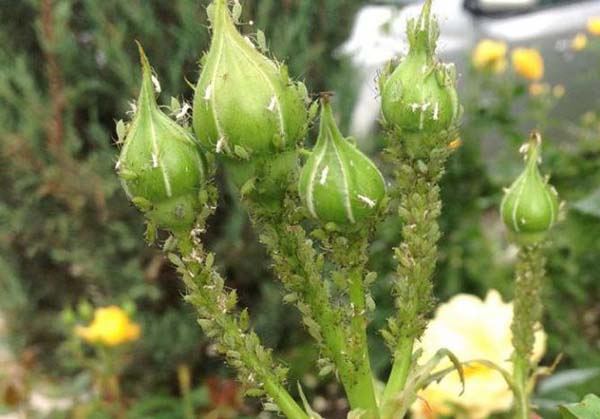
When does aphid appear on roses?
Usually, late spring-early summer, that is, in May-June.
Where does it come from?
It is difficult to say for sure why and where aphids appear on roses. The fact is that this may be preceded by several reasons at once.
Advice! As someone succinctly put it: "Aphids are an ant cow", that is why it is necessary to simultaneously deal with both malicious pests of the garden and vegetable garden.
By the way! About, how to defeat ants in your country house, described in detail in this material.
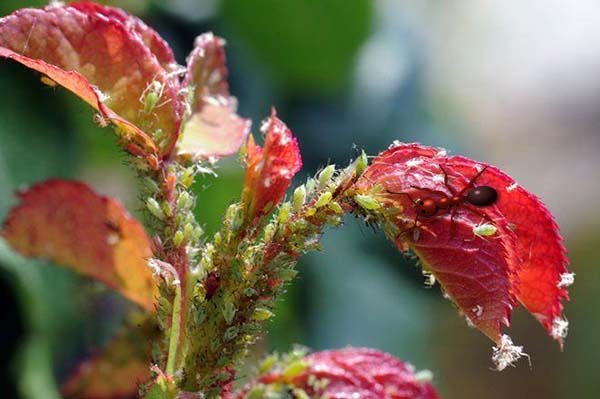
We will talk about another reason for the appearance of this small green pest in the rose garden further.
Prevention of aphids on roses: how to avoid its appearance
More often than others, aphids prefer "fattening" plants, that is, those that we excessively overfed, usually, nitrogen fertilizers and similar organic matter.
Tender young shoots of roses - a true treat for small pests. In addition, such plants (overfed with nitrogen) for the most part are deficient in potassium and phosphorus, and, therefore, more to the taste of aphids.
Therefore, it is worth taking into account the fact that look after for any plants you need correctabout. Only then will they will be less vulnerable to attack different kinds pests.
Ways to combat aphids on roses: what to spray (chemistry and biological products), what folk remedies can be used
Sometimes it happens that one preventive treatment for aphids in early spring is enough for the pest to leave our rose garden alone. But sometimes there are seasons of total invasion of the enemy, and if you do not fight in time, you can be left without the queen of the garden. Therefore, as soon as you see the first signs of aphids on the stem of a flower, take urgent measures to destroy it.
Chemicals
Among the most effective chemicals (insecticides) for the destruction of aphids on roses are (the active ingredient, the method of entry, and the chemical class of the agent are indicated in brackets):
- Aliot (Malathion (Karbofos), an intestinal-contact insecticide, organophosphorus compounds (FOS) class;
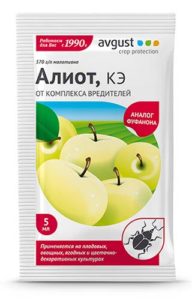
- Aktara (Thiamethoxam (Aktara), a systemic intestinal insecticide, neonicotinoid class);
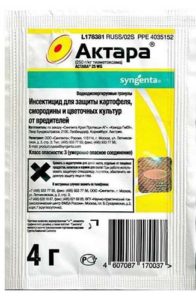
- Actellic (Pirimifos-methyl (Actellik), a systemic enteric insecticide + fumigant, organophosphorus compounds (FOS) class;
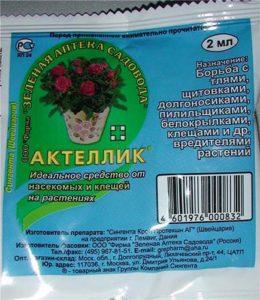
- Biotlin (Imidacloprid, systemic insecticide of intestinal action, class of neonicotinoids);
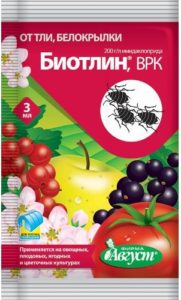
- Tanrek (Imidacloprid, systemic insecticide of intestinal action, class of neonicotinoids);
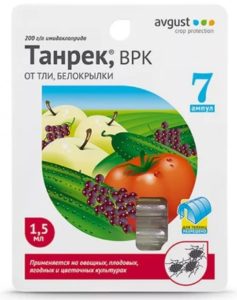
- Spark - Double effect (Permethrin and Cypermethrin, an intestinal-contact insecticide, pyrethroid class);
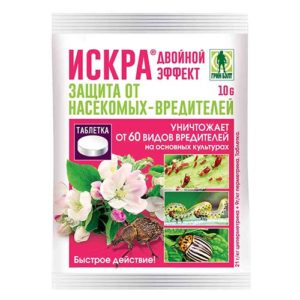
- Spark Gold (Imidacloprid, systemic insecticide of intestinal action, class of neonicotinoids);
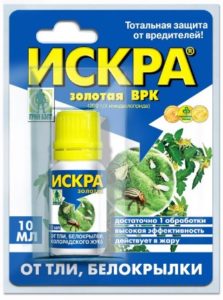
- Inta-Vir (Cypermethrin, insecticide of intestinal action, pyrethroid class);
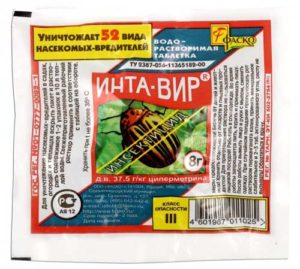
- Fufanon (Karbofos (Malathion (Karbofos), an intestinal-contact insecticide, organophosphorus compounds (FOS) class);
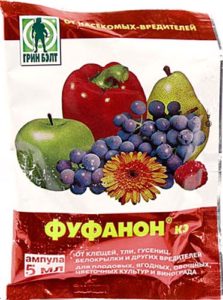
- Karbofos (Malathion (Karbofos), an enteric-contact insecticide, organophosphorus compounds (FOS) class;
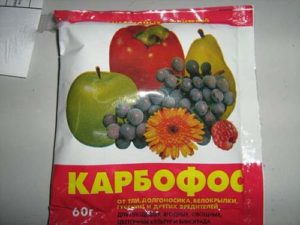
- Lightning (Lambda-cyhalothrin, enteric, pyrethroid class).
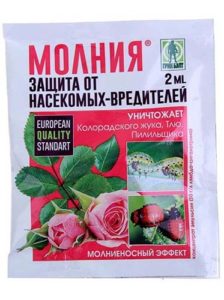
Note! It is much more correct and reasonable to use chemicals to kill aphids on roses than to combat pests on fruit trees, shrubs, and vegetables. And, of course, your rose garden should not be near the above-mentioned plants, the fruits and berries of which you eat.
Biological preparations
It is still not worth taking up chemistry right away, even if folk remedies did not help you. You may have done too few treatments or made insufficiently concentrated spray solutions. So try biological aphids first.
However! Biologics are usually prophylactic agents, that is, there is no point in waiting until all the roses are in the aphid. As soon as you see the first hints of the appearance of the pest, urgently carry out the treatment.
The most effective biological drugs that will definitely help you (albeit not instantly) get rid of aphids on roses are (the active ingredient, the method of penetration, and the chemical class of the agent are indicated in parentheses):
- Aktofit (Aversectin C, enteric contact insecticide, class Avermectins + biological pesticides);
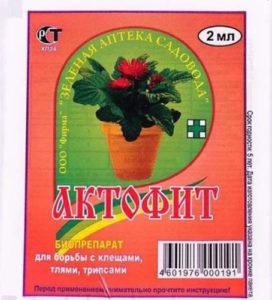
- Bitoxibacillin (Bacillus thuringiensis var. Thuringiensis, intestinal pesticide, bacterial insecticide + biological pesticide class);
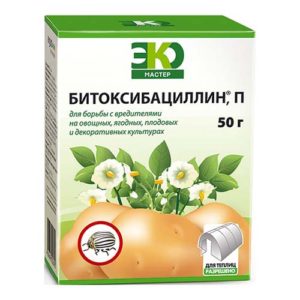
- Spark BIO (Avertin N, enteric insecticide, class Avermectins + biological pesticides);
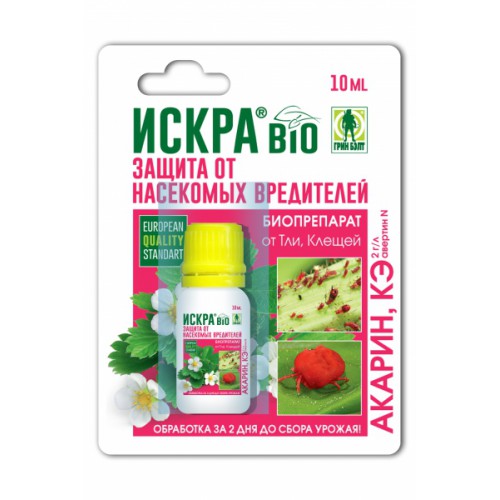
- Fitoverm (Aversectin C, enteric contact insecticide, class Avermectins + biological pesticides).
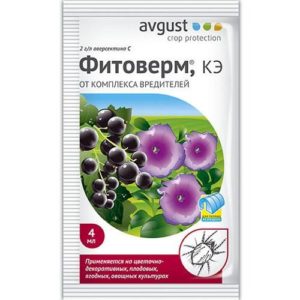
After the use of biological agents, harmful insects do not immediately disappear, since the effect of such drugs is that the pest can no longer eat and dies of hunger within about 2-3 days. Accordingly, they do not have a detrimental effect on beneficial insects that feed on the pest.
Advice! The listed biological products will also help you get rid of aphids. on cucumbers, currants and gooseberries, and also on fruit trees (apples, plums, cherries and others).
Video: how to protect plants from aphids using biological products
Folk remedies
As a rule, folk remedies for aphid control are considered less effective. However, if you regularly spray roses, you can achieve good results, so be sure to repeat the treatments at intervals of 7-10 days.
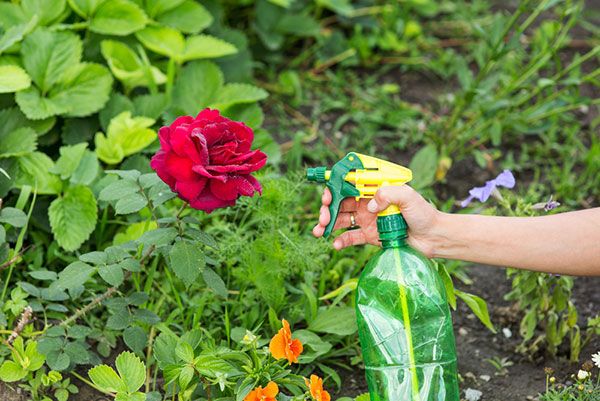
By the way! Spraying is best done in the evening after sunset so that the plant does not get burned.
Video: aphids on roses - folk remedies
Mechanical method
If there are not many aphids on roses, then you can simply collect it with your hands. But it is better to put on gloves for this, and carefully squeezing each bud, remove and crush all the green insects.
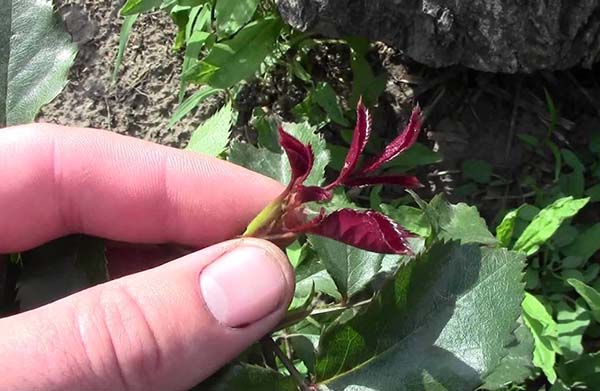
Soap solution
Laundry and tar soaps, various dish detergents, as well as cleaning agents for microwave ovens, electric grills and deep fryers - all this can help you defeat aphids, as the following videos on the Internet prove.
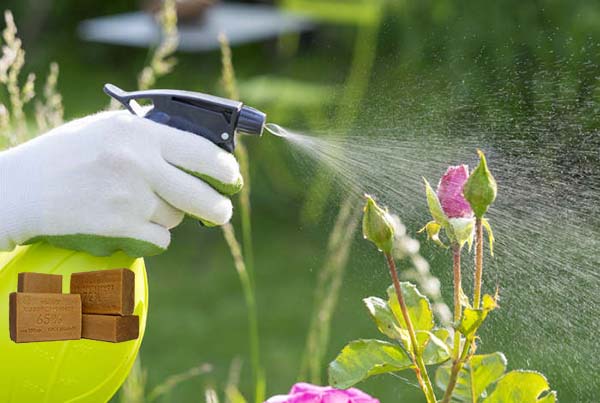
Video: how to get rid of aphids on roses using dish detergent
Video: a way to get rid of roses from aphids using a cleaner for microwave ovens, electric grills and deep fryers
Ammonia solution
Ammonia is a universal remedy against aphids, which can be used on all types of cultivated plants, including roses.
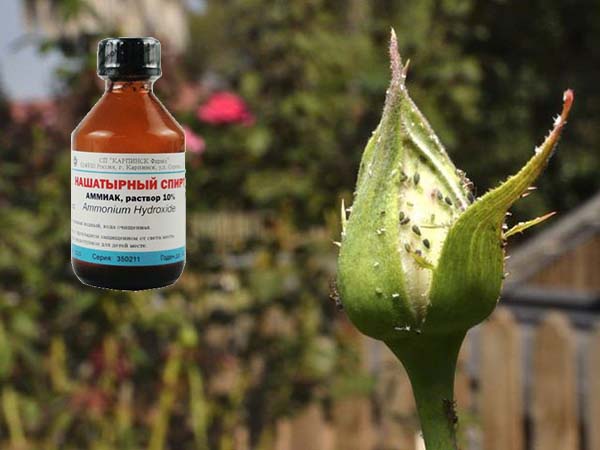
To prepare a solution for spraying roses from aphids, you will need:
- 30-40 grams or 2 tbsp. spoons (if liquid) of any detergent (laundry or tar soap, liquid soap can be used, even dishwashing detergent such as Fairy is suitable);
- 10 liters of warm water (initially it is more convenient to dissolve in a smaller container);
- 2 tablespoons (about 30-40 ml) 10% ammonia.
Video: ammonia from aphids on roses
Iodine and milk
Another interesting remedy for getting rid of aphids on roses is spraying the rose garden with a solution of iodine and milk.
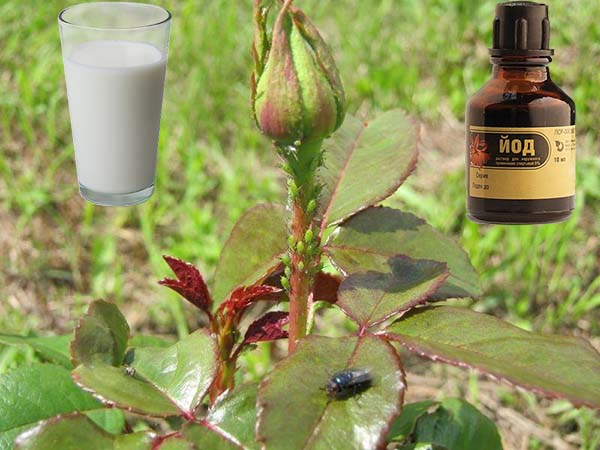
The solution for processing is prepared in the following proportions:
- 100 ml of milk;
- 0.5 ml of iodine;
- 1 liter of water.
Video: how to get rid of aphids on roses with milk and iodine
As you can see, the method is quite popular and proven by many gardeners.
Various herbal infusions and decoctions
Decoctions and infusions of field herbs and flowers, which have a strong repelling odor such as, can be relatively useful in the fight against aphids on roses. yarrow, wormwood, hypericum... Especially effective is nettle infusion, which can be prepared as follows: you need 2 kg of fresh grass, pour 10 liters of water and let it brew for 24 hours, strain, and then process.
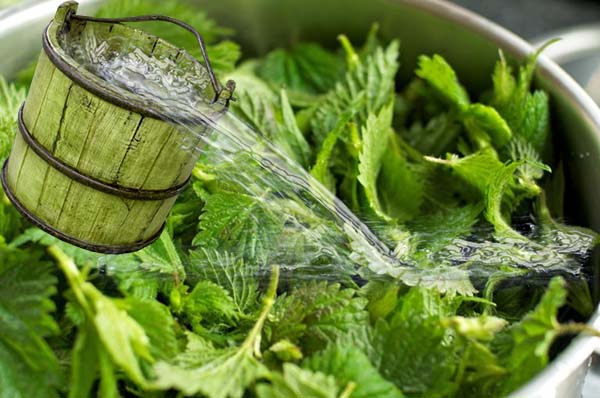
By the way! As a rule, aphids appear on roses at the same time as garlic arrows and stepchildren form on tomato bushes. All this is great for preparing infusions and decoctions against small pests.
Note! More details about the preparation of infusions and decoctions are described in this article.
Garlic infusion
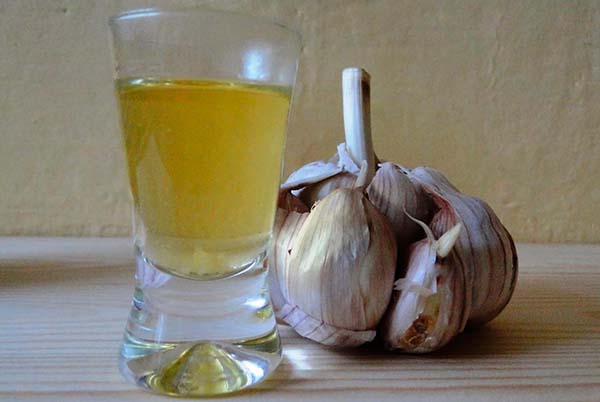
One of the most effective aphid remedies is garlic infusion, which can be prepared as follows:
- Take 400 grams of pods (arrows) or 200 grams of garlic and chop.
- Pour 1 liter of warm (but not hot) water.
- Let it brew for 1-3 days.
- Strain gently through calico.
- Dilute 1 liter of infusion in 10 liters of water.
- For better adhesion and more remains on the leaves, be sure to add soap (about 40 grams per bucket of water).
- Pour the solution into a sprayer and carefully process the bushes.
Video: infusion of garlic - a super remedy for aphids on roses
Onion peel
Infusion of onion peel Is one of the most popular and relatively effective aphid repellents.
Hot red pepper (chili)
Another vigorous folk remedy for getting rid of the aphid rose garden is its processing with a decoction of ground red pepper.
To prepare the solution for spraying, you will need: pour 50 grams of ground pepper in 1 liter of water, boil for 1 hour, then let it brew for about a day. Strain and dilute 1 to 7-8 before processing. For the solution to hold better, it is advisable to add laundry soap to it (40 grams per 10 liters).
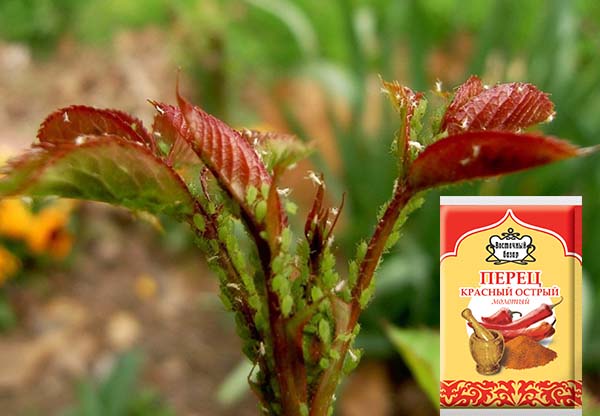
By the way! A decoction of hot pepper will also help you in the fight against mites, silkworms, leafworms, ants and slugs.
Video: red hot peppers are the best remedy for aphids
Natural enemies
Probably everyone knows that the natural main enemy of aphids is ladybug.
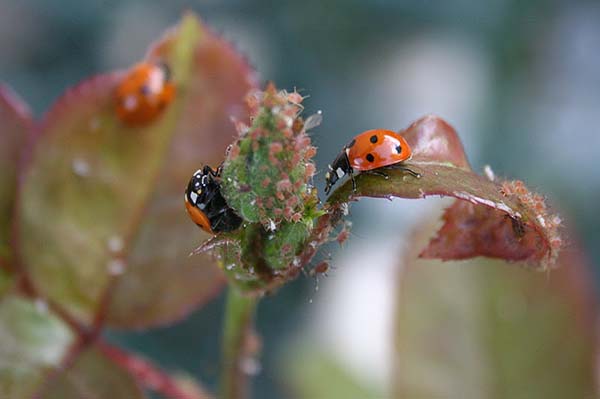
In addition, aphids like to eat for breakfast, lunch and dinner, the following insects and birds, which you can often meet in your or a neighboring cottage:
- lacewing;
- ground beetles;
- hoverflies;
- predatory bugs;
- sand wasps;
- sparrows;
- kinglets;
- warblers;
- tits;
- and other useful flying insects and birds.
In general, it is recommended to attract any birds to the garden. You can do it like this:
- In the spring, make birdhouses and titmouses (nest boxes) for them.
- Install drinkers in the summer.
- In autumn and winter, replenish food in the feeders, and for tits, you can hang bacon on twigs. (They really love him!)
Thus, birds that often receive food and shelter in your garden will try to stay close to them further.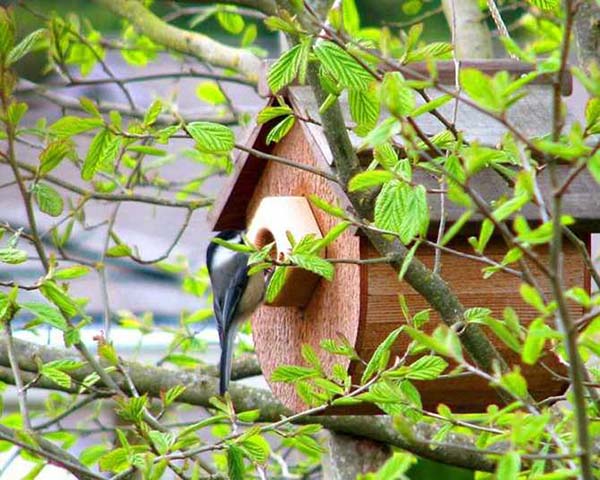
Advice! But do not overdo it, otherwise you will have to bet garden scarecrows.
Video: sparrows eat aphids on climbing roses
Plants-scarers
In addition to the fact that you can spray roses from aphids with infusion or a decoction of especially fragrant herbs, you can also plant them next to the rose garden.
So, according to ideas, the following "fragrant" flowers and greens will help scare off the pest from roses:
- marigold (tagetes);
- lavender;
- tansy;
- calendula (marigold);
- thyme;
- onion and garlic;
- mustard;
- dill, parsley and basil;
- mint.
Note! You will rather be able to make a beautiful flower arrangement with roses than completely defeat aphids. But it's worth a try!
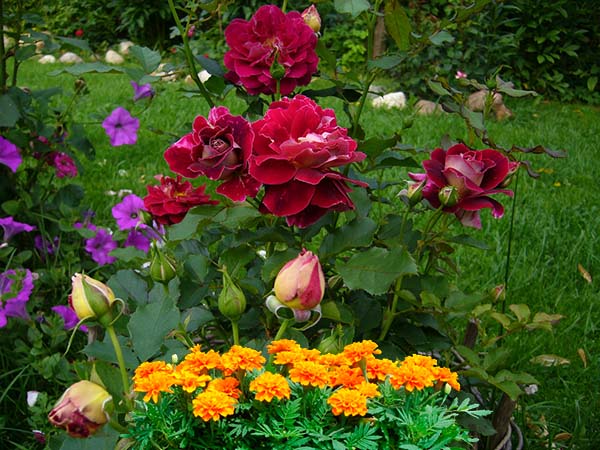
Your fight against aphids will not be meaningless if you carry out it regularly and in a variety of ways, from folk and ending with chemical and biological plant protection products. And then your roses will bloom and savor all summer long.

